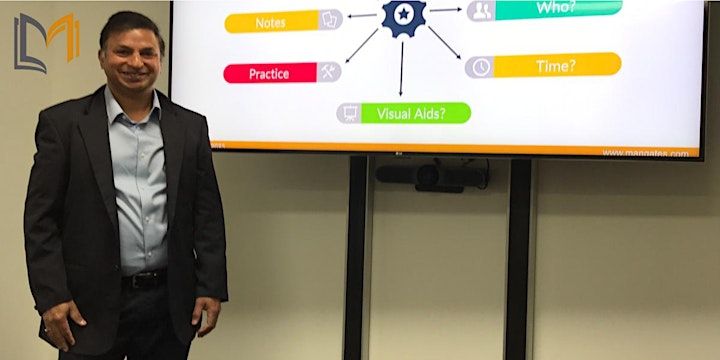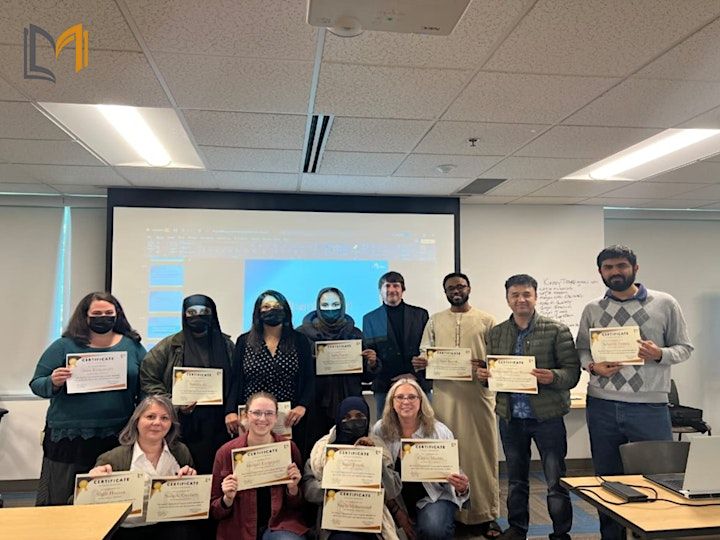Artificial Intelligence / Machine Learning Workshop in Vancouver
Schedule
Wed, 15 May, 2024 at 09:00 am to Wed, 18 Dec, 2024 at 05:00 pm
UTC-07:00Location
For venue details reach us at [email protected], PH: +1 469 666 9332 | Vancouver, BC

About this Event
Certificate: Course Completion Certificate
Language: English
Duration: 3 Days
Credits: 24
Refreshments: Snacks, Beverages and Lunch included in a classroom session
Course Delivery: Classroom
Course Description:
This course provides a comprehensive introduction to the exciting fields of Artificial Intelligence (AI) and Machine Learning (ML). Designed for students with varying levels of expertise, from beginners to those with some background in programming and mathematics, the course covers fundamental concepts, techniques, and applications of AI and ML.
Attendees will begin by exploring the foundational principles of AI, including its history, goals, and various approaches. They will gain an understanding of intelligent agents, problem-solving techniques, and the importance of knowledge representation. Emphasis will be placed on the ethical considerations surrounding AI development and deployment.
The course will then delve into the core concepts of Machine Learning, where students will learn about different types of learning algorithms, such as supervised, unsupervised, and reinforcement learning. Through hands-on exercises and projects, students will develop a practical understanding of how to apply these algorithms to real-world problems, including classification, regression, clustering, and reinforcement learning tasks.
Learning Objectives:
After the training, you will be able to:
- Describe Artificial Intelligence workloads and considerations
- Describe fundamental principles of machine learning
- Describe features of computer vision workloads
- Describe features of Natural Language Processing (NLP) workloads
- Describe features of conversational AI workload
Course Outline:
Session I: Introduction to Artificial Intelligence
- Introduction to Artificial Intelligence
- History of AI
- Types of AI
○ Based on Functionality
○ Based on Capabilities
■ Artificial Narrow Intelligence
■ Artificial General Intelligence
■ Artificial Super Intelligence
- Importance of AI
- AI vs Human Intelligence
- Building Blocks of AI
- AI Trends
- AI Statistics
- Key Takeaways
- Let’s Test What We Have Learnt
Session II: Application of Artificial Intelligence
- Applications of Artificial Intelligence in
o Marketing
o Finance
o Defense & Military
o Telecommunication
o Sales
o Healthcare
o Automobile Industry
o Gaming
o E-Commerce Industry
o Social Media
o Robots
o Education Sector
o Chatbots
o Agriculture
o Supply Chain
o Navigation
o Lifestyle
o Human Resources
- Key Takeaways
- Let’s Discuss
Session III: Core Concepts of Machine Learning
- Overview of Machine Learning
- History of Machine Learning
- Machine Learning Algorithms
o Supervised Learning
§ Regression Models in ML
§ Introduction to Regression Models
§ Types of Regression Models
§ Linear Regression
§ Polynomial Regression
§ Ridge Regression
§ Lasso Regression
§ Bayesian Regression
§ Overview of Decision Trees
§ Overview of Random Forest Algorithm
§ Classification Models in ML
§ Logistic Regression
§ KNN Algorithm
§ Naive Bayes Algorithm
§ SVM Algorithm
o Unsupervised Learning
§ Clustering in ML
§ Types of Clustering in ML
§ Partitioning Clustering
§ Density-Based Clustering
§ Distribution Model-Based Clustering
§ Hierarchical Clustering
§ Fuzzy Clustering
§ Overview of Clustering Algorithms in ML
§ Types of Clustering Algorithms
§ K-means Algorithm
§ Mean-Shift Algorithm
§ DBSCAN Algorithm
§ Expectation-Maximization Clustering using GMM
§ Agglomerative Hierarchical Algorithm
§ Affinity Propagation
§ Application of Clustering
§ Association Rule Learning
§ Apriori Algorithm
§ Eclat Algorithm
§ F-P Growth Algorithm
§ Applications of Association Rule Learning
§ Hidden Markov Model
o Reinforcement Learning
Importance of Machine Learning
- Steps in Machine Learning
o Data Collection
o Data Preparation
o Choosing a Model
o Training the Model
o Evaluating the Model
o Parameter Tuning
o Making Predictions
- Advantages of Machine Learning
- Disadvantages of Machine Learning
- Future of Machine Learning
- Key Takeaways
- Let’s Test What We Have Learnt
Session IV: Use Cases of Machine Learning
- Introduction to Automatic Language Translation using ML
o Google Translate
o Microsoft Translate
o Facebook Translator
o Limitations of Automatic Language Translator
- Introduction to Medical Diagnosis Using ML
o Objectives of ML-powered Medical Diagnosis
o Benefits of ML-powered Medical Diagnosis
o Applications of ML-powered Medical Diagnosis
o Organizations using ML for Medical Diagnosis
- Introduction to Image Recognition using ML
o Working of Image Recognition
o ML Image Recognition Models
o Image Recognition Application for Face Analysis
o Image recognition Application for Animal Monitoring
- Introduction to Speech Recognition using ML
o Speech Recognition System
o Key Features of Speech Recognition
o Speech Recognition Algorithms
o Speech Recognition with Machine Learning Use Case: IBM
- Key Takeaways
- Let’s Test What We Have Learnt
Session V: Deep Learning in a Nutshell
- Introduction to Deep Learning
- Importance of Deep Learning
- Working of Deep Learning
- Machine Learning vs Deep Learning
- Functions of Deep Learning
o Sigmoid Activation Function
o Hyperbolic Tangent Function
o ReLU
o Loss Functions
§ Mean Absolute Error
§ Mean Squared Error
§ Hinge Loss
§ Cross-Entropy
o Optimizer Functions
§ Stochastic Gradient Descent
§ Adagrad
§ Adadelta
§ Adaptive Moment Estimation
- Deep Learning Process
o Working of Deep Learning
o Deep Neural Network
o Deep Learning Technique
o How to Create Deep Learning models?
o Two Phases of Learning
- Advantages of Deep Learning
- Applications of Deep Learning
o Detecting Developmental Delay in Children
o Colorization of Black and White Images
o Adding sound to Silent Movies
o Pixel Restoration
o Sequence Generation
o Toxicity testing for chemical structures
o Radiology/Detection of mitosis
o Market Prediction
o Fraud Detection
o Earthquake Prediction
o Deep Fakes
- Limitations of Deep Learning
- Key Takeaways
- Let’s Discuss
Session VI: Fundamentals of Natural Language Processing (NLP), Natural Language Generation (NLG), and Natural Language Understanding (NLU)
- Introduction to Natural Language Processing (NLP)
o Understanding NLP
o NLP Techniques
o Working of NLP
o Importance of NLP
o Steps of NLP
§ Lexical Analysis
§ Syntactic Analysis
§ Semantic Analysis
§ Discourse Integration
§ Pragmatic Analysis
o Applications of NLP
- Introduction to Natural Language Generation (NLG)
o Working of NLG
o Applications of NLG
o Advantages of NLG
- Introduction to Natural Language Understanding (NLU)
o NLP vs NLU
o NLU Use Cases
§ Automatic Ticket Routing
§ Automated Reasoning
§ Machine Translation
§ Question Answering
o Importance of NLU
o Factors to Consider while selecting NLU solutions
o Evaluating the accuracy of NLU solutions
o Leading NLU Companies
- NLP vs NLG vs NLU
- AI vs ML
- ML vs DL
- AI vs ML vs DL
- Key Takeaways
Session VII: Hybrid Artificial Intelligence – Machine as Creative Partners
- Overview of Hybrid Model
- Pros and Cons of Hybrid Model
- Introduction to ANN (Artificial Neural Network)
o Layers in a Neural Network
o Neurons in a Neural Network
o Activation Function in a Neural Network
o Threshold Function in a Neural Network
o Sigmoid Function in a Neural Network
o Rectifier Function in a Neural Network
o Hyperbolic Tangent Function in a Neural Network
o Working of a Neural Network
o Introduction to Gradient Descent
§ Types of Gradient Descent
o Introduction to Backpropagation
§ Advantages of Backpropagation
§ Disadvantages of Backpropagation
o Advantages of ANN
o Disadvantages of ANN
- Introduction to CNN (Convolutional Neural Network)
o Working of CNN
§ Convolutional layer in CNN
§ Hyperparameters of Convolutional Layer in CNN
§ Pooling Layer in CNN
§ Fully-Connected Layer in CNN
- Introduction to Autoencoders
o Components of Autoencoders
o Types of Autoencoders
o Applications of Autoencoders
- Introduction to Variational Autoencoders
- Introduction to Feedforward Neural Networks
Introduction to Recurrent Neural Networks (RNN)
o Recurrent Neural Network vs Feedforward Neural Network
o Why RNN?
o Problems with RNN
o Types of RNN
o Variants of RNN Architectures
§ Bidirectional RNN
§ Long Short-Term Memory
§ Gated Recurrent Units
o Advantages of RNN
o Disadvantages of RNN
o Applications of RNN
- Introduction to Mixture Density Network
o Components of Mixture Density Networks
o How does a Mixture Density Network look like?
- Key Takeaways
- Let’s Discuss
Session VIII: Essentials of Successful AI Strategy for Business
- AI Strategies for Business Outcomes
- Evaluating Current Capacities of AI
- Building an AI Strategy
- Roadmap For Building a Viable AI Strategy
- Strategy for AI Business Models
- Five-Step Implementation Plan for AI
- AI Assessment Roadmap
- Top AI Job Roles
- Myths and Facts around AI
- ABCDE Framework for AI Enterprise Strategy
- Key Takeaways
- Let’s Discuss
Prerequisites:
Prerequisite is not required for taking this course. Anyone can with some basic awareness of computing and internet concepts, and an interest in using AI services.
Specifically:
- Experience using computers and the internet.
- Interest in use cases for AI applications and machine learning models.
- A willingness to learn through hands-on exploration.
Who can Attend?
The Artificial Intelligence / Machine Learning course is designed for anyone interested in learning about the types of solution artificial intelligence (AI) makes possible. You don’t need to have any experience of using AI before taking this course, but a basic level of familiarity with computer technology and the Internet is assumed. Some of the concepts covered in the course require a basic understanding of mathematics, such as the ability to interpret charts.

The mission of every organization is affected by today’s global economy and the digital era. Organizations are critically dependent on information technology (IT) to better support their Business Goals. Risk Management plays a critical role in protecting an organization’s information assets, and its mission therein, from any related Risk. An effective Risk Management Process is an important component of a successful security program. The principal goal of an organization’s Risk Management Process should be to protect the organization and its ability to perform its mission, not just its assets. Therefore, the Risk Management Process should not be treated primarily as a technical function carried out by the experts who operate and manage the system, but as an essential management function of the organization.
Risk is the net negative impact of the exercise of a vulnerability, considering both the probability and the impact of occurrence. Risk Management is the Process of identifying Risk, assessing Risk, and taking steps to reduce risk to an acceptable level. This course provides an overview of the specific criteria, steps, and actions necessary to implement and sustain a comprehensive Information Risk Management program.

Supply Chain Management improves the coordination and relationship between Suppliers, Producers, and Customers. It must be kept at a high level of organization to be successful in today’s global economy. Goods and services are now pieced together from all over the world, and this process can be hectic and complicated if not managed correctly.
With Supply Chain Management your company and employees will be on target to lower costs, improving efficiency, and increase customer satisfaction. This course will provide your employees with the understanding of how Supply Chain Management can improve and help almost any type of business.

The HDI Problem Management Professional certification is intended for those who wish to gain a working knowledge of industry Best Practices related to problem Management. It is ideal for IT professionals who are working or are planning to work within problem Management, whether in a technical, managerial, or operational role.
The responsibilities of problem Management professionals vary from organization to organization, but they often include: assisting with the planning and implementation of the Problem Management Process; performing both reactive and proactive problem Management; prioritizing and categorizing problems; investigating and diagnosing the problems; coordinating and/or executing root cause analysis; developing workarounds, and proposing changes to resolve issues.
The HDI Problem Management Professional Certification Standard is based on the concepts, Principles, and Best Practices found in various ITSM frameworks, including ITIL, ISO/IEC 20000, and COBIT.

Anyone involved in the performance management or appraisal process. This could include Directors, Managers, Team Leaders, HR Professionals. This training will help to develop performance management skills.
Course Contents:
Expert Training to Improve Performance Management
Often treated like a box-ticking exercise, effective performance management is actually fundamental to achieving a successful future. Performance management is not a fixed sequence of events, but a continuous process that constantly adapts to the needs of the team.

Anyone in a position of managing or leading others will benefit from the message delivered by this managing performance training.
This training set out to helps you to manage the performance of your workforce through common sense techniques that focus on the effective use of communication and goal setting to improve productivity and increase morale and motivation.
The session will steer away from the procedural, form-filling approach to performance management/appraisals and instead focus on the skills required to effectively co-operate with team members, develop their skills and ensure they feel incentivized to succeed.
With the techniques outlined in this training course, you will feel empowered to enhance the performance of your team and begin to collaborate with them to improve their behaviors and ability in their role.

With this course, you will be able to provide the skills, guidance, and empowerment to your team of managers. They will then be better suited in leading and motivating their team and thus produce fantastic results. To be a successful manager means having a wide range of skills. Through this workshop, you will be able to disperse your knowledge and experience throughout your leadership team.
Manager Management takes a special type of leader. This workshop will expand your participant’s knowledge and provide a way for them to teach and lead new and experienced managers. As every manager knows that learning never stops, this workshop will have something for everyone.

Leading Effective Teams training based on leading teams, will help anyone that leads a team or is involved in a leadership role. It is also useful for those that are about to embark on a position of leadership or need to develop their leadership skills.
<h4>Course Contents:</h4>Having an effective team around you is crucial. However, it is an area that is often left to chance, which can lead to de-motivated individuals that do not feel part of the business and consequently do not perform.
This Leading Effective Teams training looks at what it takes to lead an effective team and how you can get the best out of the people in it by understanding the role of a leader, both personally and from the point of view of the team.

Recently tasks that were originally thought to fall under the responsibility of the human resources department have become a part of many managers” job descriptions. The sharing and diffusion of these tasks throughout the organization has had an impact particularly on those that are not equipped with the skills or knowledge to deal with these issues.
The Human Resource Management workshop will give managers the basic tools to handle numerous human resource situations such as interviewing, orientation, safety, harassment, discrimination, violence, discipline, and termination. This workshop will provide your participants those skills and assist them with certain Human Resource situations.

Every day, managers solve difficult problems, turn organisations around, and achieve astonishing performance. To be successful, every organisation needs good managers.
This Essential Management Skills training suitable for anyone that works in a management or leadership role. They will provide the perfect foundation for new managers to develop and grow, while giving existing managers the chance to review their current skills and build on their performance.

Employee Engagement is a necessary strategy for companies that want to succeed in the marketplace. Employee engagement is not an HR initiative that managers are reminded to do once a year. It is a key strategic driver of employee performance, accomplishment, and continuous improvement all year long. It is the outcome of how your organization interacts with people to drive business results.
This Employee Engagement training suitable for anyone that works in a management or leadership role.

Your relationship with your vendors can often make or break a project baseline. In this short course, you will learn best practices for managing the vendor relationship from initiation to close, including documenting requirements, negotiating contract terms, and evaluating proposals. You’ll learn how and why to establish clearly defined roles and responsibilities between you and your vendors.

Employee Engagement is a necessary strategy for companies that want to succeed in the marketplace. Employee engagement is not an HR initiative that managers are reminded to do once a year. It is a key strategic driver of employee performance, accomplishment, and continuous improvement all year long. It is the outcome of how your organization interacts with people to drive business results.
This Employee Engagement training suitable for anyone that works in a management or leadership role.

Crisis management is as important as finance management, personnel management, etc. Having a clear and effective program and plan for an event is critical not only to your survival but critical to the profitability and possibly the survival of the company. Being able to identify risk, assess the situation, and respond appropriately is important, and requires not only training but practice.
With our Crisis Management workshop, your participants will understand that a crisis can occur at any time. They will develop the skills needed for certain negative events. Also, they will be able to recognize warning signs to help avoid negative situations completely, or, if the situation occurs, better manage the crisis.

Disagreements, differences of opinion and conflicting perspectives on key issues inevitably arise in any context where people are working together.
Research has shown that workplace conflicts can become highly destructive. Negative emotions may be stirred up, poisoning team morale, creating stress and destroying relationships.
Conflict may emerge between managers and their staff, between team members or departments.
Conflict may be expressed openly, but it may also be hidden, in the form of irritation, resentment, loss of morale and lack of commitment. Hidden conflict is easy to miss and therefore can be particularly damaging.
Ultimately, this is likely to have an adverse effect on team and company performance, costing time and money.
It is therefore vital to manage conflict constructively.
As an team member and leader, your ability to deal with and resolve conflicts defines your success in the longer term.
Our one day workshop in Conflict Management and Communication Skills immerses you in the most advanced conflict management tools, strategies and practices applicable today. You will gain hands on practice on proven frameworks, go through simulations and exercises that will train you to be highly effective professional and leader, starting day one.
Where is it happening?
For venue details reach us at [email protected], PH: +1 469 666 9332, Vancouver, CanadaEvent Location & Nearby Stays:
CAD 2295.00 to CAD 2595.00




















